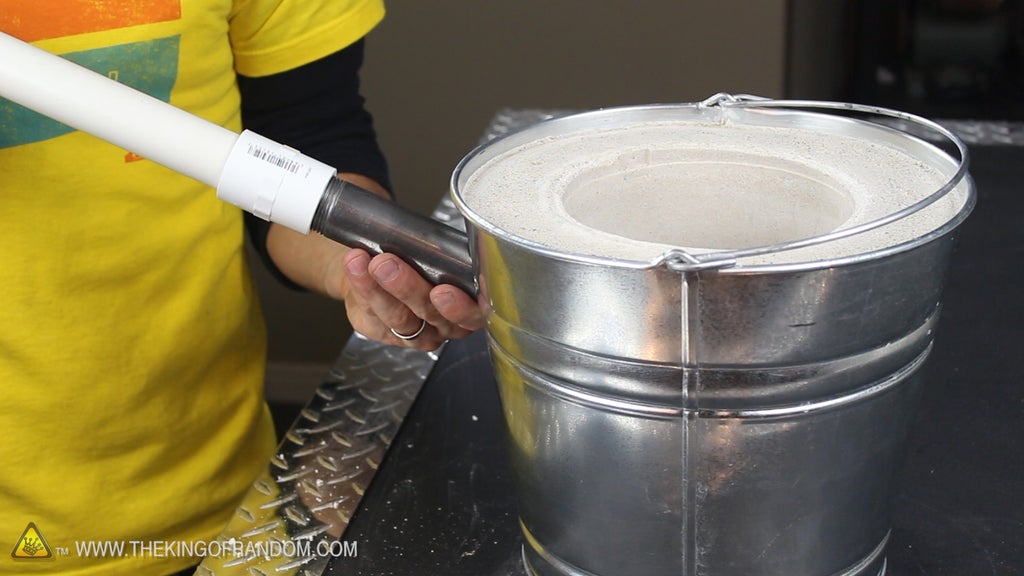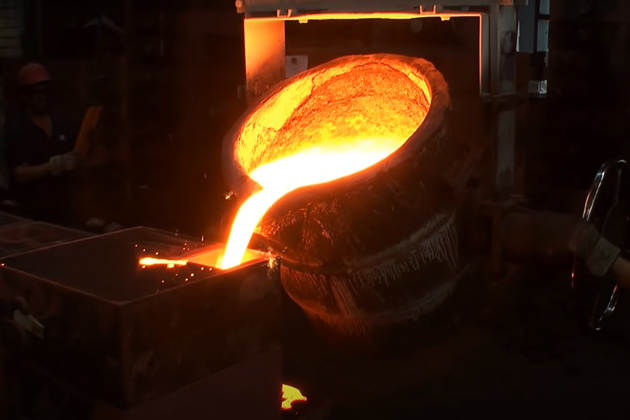Ways modern Metal Foundry innovations improve results in manufacturing
Wiki Article
How a Metal Foundry Adds To Sustainable Metal Production Practices
Metal foundries play an essential duty in promoting sustainability within the metal production market. By including recycled products, they minimize dependence on virgin sources and reduce environmental impacts. Energy-efficient melting procedures additionally decrease power usage and discharges. The trip toward sustainable methods entails even more than simply reusing and energy administration. It incorporates a broader commitment to moral sourcing and ingenious technologies. The ramifications of these methods are considerable and warrant better assessment.The Duty of Recycling in Metal Foundries
While metal manufacturing has actually typically depended on virgin materials, the boosting focus on sustainability has led to a significant change in methods, particularly in metal foundries. Recycling has become a vital component of this transformation, permitting foundries to repurpose scrap metal and reduce reliance on extracted sources. By integrating recycled materials into their processes, foundries not just reduce ecological effect yet likewise lower production costs.Making use of recycled metals, such as copper, aluminum, and steel, lessens energy intake and decreases greenhouse gas exhausts associated with standard mining and refining methods. Furthermore, foundries can attain top quality results by employing sophisticated sorting and handling modern technologies to ensure the purity of recycled products. This focus on recycling fosters a round economic situation, where waste is lessened, and resources are made use of efficiently. As a result, metal foundries play a crucial function in advertising lasting techniques within the metal manufacturing industry.
Energy-Efficient Melting Strategies
Energy-efficient melting methods are crucial for enhancing sustainability in metal manufacturing. These strategies considerably lower power consumption throughout the melting procedure, which is among the most energy-intensive phases in metal production. Technologies such as induction melting, resistance home heating, and microwave melting offer improved performance contrasted to typical approaches. Induction melting, for instance, uses electromagnetic areas to produce heat straight within the metal, reducing energy loss and offering precise temperature control.Furthermore, executing warmth recuperation systems can better enhance effectiveness by recording and recycling waste warmth produced throughout melting. Utilizing advanced insulation materials and maximizing furnace designs likewise contribute to energy financial savings. By taking on these innovative melting strategies, metal foundries can reduce their carbon footprint, decrease operational costs, and add to a much more lasting production landscape. The integration of energy-efficient practices not just aligns with environmental goals but additionally meets the growing need for liable production methods in the metal industry.
Lasting Sourcing of Raw Materials
Sustainable sourcing of basic materials is vital for decreasing the ecological effect of metal manufacturing. This involves the boosted application of recycled metals, the adoption of moral mining techniques, and initiatives targeted at local sourcing. By prioritizing these strategies, the industry can promote accountable source monitoring and assistance local economic climates.
Recycled Metal Utilization
Exactly how can sectors properly decrease their environmental effect while meeting the expanding need for metal? One significant strategy is the application of recycled metal. By incorporating scrap metal into their manufacturing processes, foundries can lower the extraction of virgin materials, thereby minimizing and saving natural sources power consumption. Recycled steels call for much less energy to process compared to their raw equivalents, resulting in lower greenhouse gas exhausts. Additionally, making use of recycled metal helps draw away waste from landfills, advertising a round economic climate. Industries that prioritize recycled metal not only add to sustainability however also benefit from price savings associated with minimized product purchase. Subsequently, recycled metal usage stands as a necessary approach for eco responsible metal manufacturing.Ethical Mining Practices
While the demand for steels proceeds to climb, markets are increasingly identifying the significance of moral mining methods in guaranteeing responsible sourcing of resources. Moral mining includes a commitment to environmental stewardship, social obligation, and adherence to reasonable labor practices. Firms are currently prioritizing partnerships with mines that show openness in their procedures, lessening eco-friendly influence and valuing regional communities. This approach not only cultivates a lasting supply chain however also boosts the online reputation of organizations entailed. By executing rigorous standards and qualifications, sectors can deal with illegal mining tasks and advertise the well-being of employees. Inevitably, moral mining methods add considerably to an extra lasting metal manufacturing community, lining up financial development with social and ecological integrity.Local Sourcing Initiatives

Technologies in Metal Casting Procedures
Developments in metal casting processes are transforming the industry by incorporating innovative recycling techniques that minimize waste. Energy-efficient melting techniques are also being created to minimize energy usage throughout production. Furthermore, the use of ingenious mold materials contributes to boosted performance and sustainability in casting procedures.Advanced Recycling Techniques
Advanced recycling methods are changing metal casting procedures, significantly improving sustainability in the market. These innovations concentrate on reprocessing and recovering scrap metal, substantially reducing waste and the need for virgin materials. Methods such as hydrometallurgy and pyrometallurgy allow foundries to draw out important steels from made use of elements, making certain efficient resource use. Additionally, advanced sorting and purification modern technologies improve the quality of recycled metals, making them appropriate for high-performance applications. This not only lessens the ecological impact of metal manufacturing but likewise promotes a round economic climate by promoting the reuse view it of products. As these reusing techniques remain to progress, they assure to additionally streamline procedures within foundries and add to an extra sustainable metal manufacturing landscape.Energy-Efficient Melting Techniques
While traditional melting techniques have long been the backbone of metal casting, current advancements have presented energy-efficient methods that considerably reduce power intake and discharges. Technologies such as induction melting and electrical arc heaters have gained prestige, allowing for exact control over temperature level and minimizing the requirement for nonrenewable fuel sources. These techniques not just improve power effectiveness however additionally advertise faster melting times, which equates to decrease functional costs. Furthermore, developments in warmth recuperation systems allow foundries to capture and recycle excess warm created during the melting process. This all natural strategy to energy monitoring not just sustains sustainable techniques but also placements metal foundries as leaders in the shift towards greener production procedures, better lining up with worldwide sustainability objectives.Cutting-edge Mold Products
As the demand for even more lasting and effective metal casting processes expands, the expedition of ingenious mold and mildew materials has ended up being a centerpiece in the industry. Typical mold and mildew materials commonly contribute to environmental challenges, prompting the search for options that minimize waste and power consumption. Recent advancements include the growth of biodegradable binders and recyclable composites, which not just boost mold efficiency however also minimize ecological effect. In addition, the use of 3D printing innovation in mold development enables for intricate layouts that minimize product usage and make it possible for rapid prototyping. These ingenious products not only enhance casting accuracy yet additionally align with sustainability objectives, showcasing the industry's commitment to lowering its carbon impact while preserving high-grade production requirements.Lowering Waste With Advanced Technology
Ingenious innovations are changing the metal manufacturing industry by greatly decreasing waste and improving performance. Advanced data analytics and maker learning algorithms make it possible for foundries to enhance manufacturing processes, decreasing and determining ineffectiveness scrap product. Smart sensors keep an eye on devices efficiency in real-time, enabling anticipating upkeep that minimizes downtime and waste generation. In addition, additive production strategies, such as 3D printing, enable the creation of facility components with marginal material use, considerably decreasing waste compared to typical methods.
Furthermore, closed-loop systems are coming to be more prevalent, wherein scrap metal and by-products are recycled back into the manufacturing cycle, making certain that products are utilized to their greatest possibility - Metal Casting. This assimilation of modern technology not just advertises resource conservation however likewise boosts the total sustainability of metal production methods. By accepting these improvements, foundries can add to a more lasting future while preserving competition in the marketplace
The Effect of Foundries on Carbon Impact Decrease
Foundries play an essential role in lowering the carbon footprint of the metal manufacturing market by applying different sustainable practices. By utilizing energy-efficient innovations, such as electrical arc heaters, these facilities significantly reduced greenhouse gas discharges contrasted to standard methods. In addition, foundries increasingly take on renewable resource resources, which also decreases their reliance on fossil gas.Reusing scrap metal is another vital method that foundries utilize, saving sources and minimizing the requirement for virgin materials. This not just lessens waste but likewise cuts down on the energy-intensive removal processes associated with mining. In addition, the adoption of closed-loop water supply aids to lessen water use and lower wastewater discharge, contributing to a much more sustainable procedure.
With these campaigns, foundries demonstrate their commitment to ecological stewardship, leading to a significant decrease in the general carbon footprint of the metal manufacturing industry. Their continuous efforts are critical in the change towards a more lasting commercial landscape.
Often Asked Concerns
What Kinds of Metals Are A Lot Of Commonly Recycled in Foundries?
Aluminum, steel, brass, and copper are among one of the most generally recycled steels in foundries. These metals are preferred due to their high recycling prices, economic value, and prevalent availability, contributing considerably to commercial sustainability initiatives.How Do Foundries Make Certain the Quality of Recycled Products?
Foundries ascertain the high quality of recycled products through extensive testing, arranging, and purification processes. They carry out sophisticated technologies to assess structure and get rid of pollutants, guaranteeing that the recycled steels satisfy industry criteria for efficiency and safety and security.
What Qualifications Exist for Sustainable Foundry Practices?
Numerous accreditations exist for lasting foundry methods, including ISO 14001 for ecological administration, ISO 50001 for power monitoring, and LEED accreditation for sustainable building practices (Aluminum Foundry). These certifications assist assure adherence to ecological and sustainability requirements in operationsHow Do Foundries Gauge Their Carbon Impact Reduction?
Foundries gauge carbon impact reduction through tools like lifecycle evaluations, power audits, and exhausts tracking systems. They contrast standard exhausts to present outputs, examining enhancements in power efficiency, material use, and renewable resource fostering with time.What Are the Economic Advantages of Sustainable Metal Production?
Lasting metal manufacturing uses economic advantages such as reduced operational expenses, raised efficiency, enhanced market competition, and prospective federal government incentives. Additionally, it promotes development and attracts ecologically aware consumers, inevitably driving long-lasting success for businesses.Metal foundries play an important duty in promoting sustainability within the metal production market. While metal production has traditionally depended on virgin products, the increasing emphasis on sustainability has actually led to a substantial shift in techniques, from this source particularly in metal foundries. By incorporating scrap metal into their production procedures, foundries can lower the removal of virgin materials, consequently preserving natural sources and reducing power consumption. Foundries play click here now a crucial duty in decreasing the carbon impact of the metal manufacturing market by executing numerous lasting techniques. Reusing scrap metal is an additional crucial method that foundries utilize, preserving sources and minimizing the demand for virgin products.
Report this wiki page